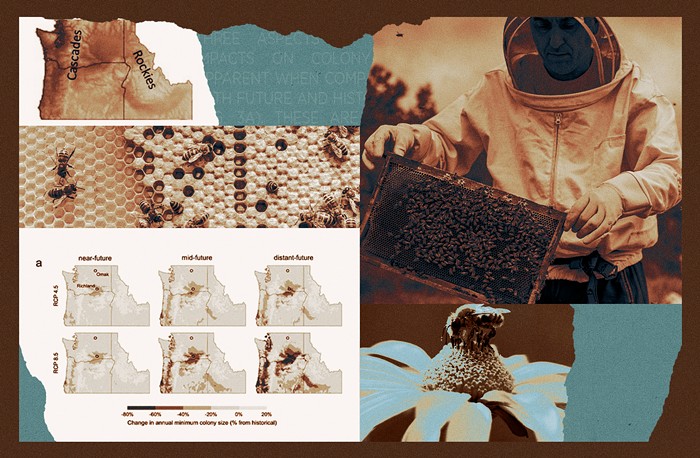
The images of Hurricane Harvey fill all my screens this week, with misery and environmental loss and grandmothers in submerged wheelchairs. To be honest, I have empathy fatigue. My adrenal system isn’t responding to the horror normally, and so I scroll through devastation as if it is a featureless landscape. That is the moral trauma and exhaustion of climate change.
Hurricane Harvey was made more deadly and destructive by climate change, through a combination of sea level rise, increased atmospheric temperatures, and increased moisture content in the atmosphere. If you don’t like that attribution–take your arguments over to the peer-reviewed literature. It is not political rhetoric to talk about climate change during extreme weather events—it is necessary and human. There is a direct link between advocating for public safety and advocating for climate action, and Harvey, along with Sandy and Katrina, demonstrate that deadly and destructive link.
No, in retrospect, it is all part of an interweaving fabric of environmental trauma. If I had known how to advocate for the people of Houston, I would have.
What does it even mean, to advocate? Both a noun and a verb, it is both an act and an identity. It seems banal—simply the public support of a cause. However, it is hugely problematic in my circles, where the rubber of science hits the road of the real world, of lives and dollar bills and power. Did you know it's seen as compromising for a scientist to be an advocate? That’s right, public dispassion is required for this club, unless, of course, you are willing to risk the derision of your peers. Indeed, the term “advocate scientist” is used as an insult.
Let me tell you how asinine that is: We expect physicians to advocate for the health and happiness of their patients, right? Indeed, we hope our own physicians are using the best, most relevant, consensus medical science to protect and improve our health. Why would Earth, ocean, or ecological scientists be expected to act any differently, when we are just as sure and just the same as medical doctors?
Moreover, who are we to not advocate for our own lives, our families, and the landscapes of our homes? Why does the dispassion of the scientific enterprise require me to divest myself from myself? Conflict of interest—I get that. We all need to follow the dollars when evaluating public expert voices. For example, if you are scientist funded by a private pharmaceutical company, you need to be pretty darn sure that your results reflect the weight of the evidence and not the weight, or lack thereof, of your pocketbook. As professionals, we should not use our scientific credentials to hawk evidence-free pet projects which line our pockets. This should be obvious.
And, as a scientist, you learn to apply a deeply questioning and skeptical framework to information and ideas. This is an easy sentence to write, but it is very different in practice. To adopt this mindset, you parse what you know about the world and deconstruct all the magical thinking and bullshit that we all bring to our work. Participating in science can forcibly parse the mind and remove you of your unnecessary pieces. Again, an easy sentence to write, but a bitter and rendering process to undergo.
This means, in practice, that scientists shouldn’t advocate for bullshit. The entire scientific community pays through the nose, in the currency of public trust, for the public distortion of evidence by even just one individual or team. And, the stakes are too high, as we have seen most recently in Houston, for the credibility of scientists, and in particular climate scientists, to be eroded in the public eye any further. We must use climate science to make decisions to protect the lives and homes of people. Full stop.
When I think of things that I would advocate for, I of course immediately think of my son. Just for context, I grew this person inside of my body. I birthed him. I split my body into pieces. I never was the same since. If love means anything, it means this child's health, happiness, and future.
I would also advocate for snow. For the Cascadian range. I think of riding Chair 6 at Mt. Baker Ski Area as a senior in high school, on a Tuesday skipping school, with the sky shitting snowflakes the size of goose down. I don’t know what that is–but those cold solo days on the ski hill as a teenager saved my life. Or rather, they gave me a life that I could understand.
And, I would advocate for science. If I know anything, I know that we have to use Earth and climate science to protect and steward public health and safety. This means acting on climate change and this means now. 2017. We must immediately reduce global carbon emissions and deliver on aspirational, long-term, science-informed decision-making pathways.
In short, I cannot possibly divest myself from myself. Public experts should not be expected to contort themselves into a pretzel of objectivity; you can be a scientist and be a human being at the same time. But, if we are to actually look directly at the enormous and necessary task of greenhouse gas emission reduction, then scientific advocation is fundamental. It is the gateway. We must, together, advocate for our shared future—a cooler, safer, saner future we are all invested in.















